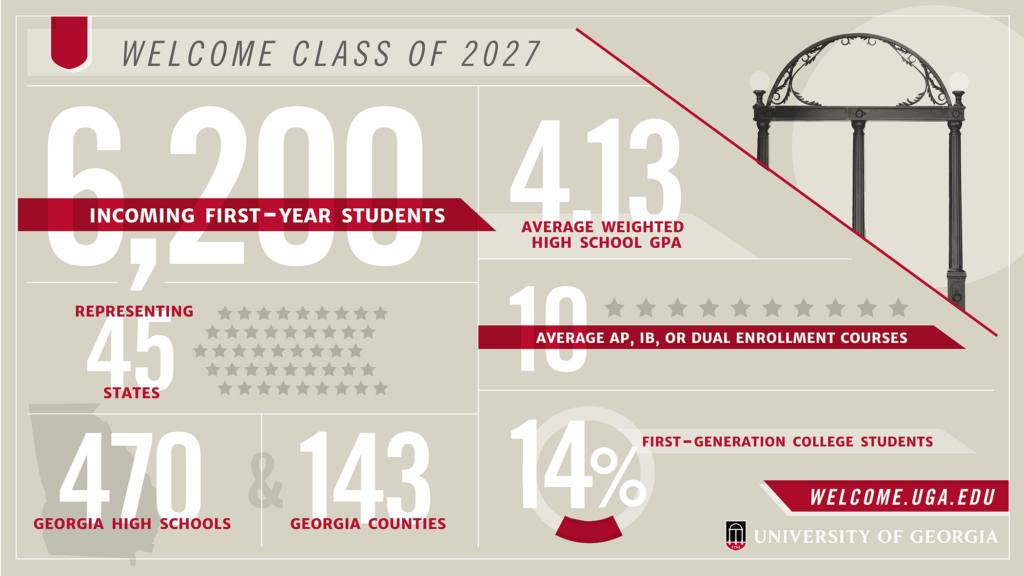The University of Georgia is welcoming 6,200 new first-year students as classes start Aug. 16. The incoming class is one of the largest and most academically qualified in UGA’s history and was selected from a record number of more than 43,500 applicants.
The rigor of students’ high school coursework relative to what is available at their school remains a key factor in admissions decisions at UGA. The first-year students arrive with an average of 10 Advanced Placement, International Baccalaureate or dual-enrollment courses. The class has an average high school GPA of 4.13. This marks the seventh consecutive year that the average weighted high school GPA of the entering students exceeds 4.0. The class of 2027 also posts an average ACT score of 30 and an average SAT score of 1339. The class includes 215 incoming Georgia valedictorians and salutatorians.
“This fall’s incoming class demonstrates a remarkable dedication to excellence,” said President Jere W. Morehead. “They will be in good company at UGA as they join an esteemed academic community that is committed to making a positive impact on our state, nation and world.”
About the incoming class
The incoming class includes students from 470 Georgia high schools, 143 Georgia counties, 45 states and 14 nations. Approximately 81% of the first-year students are Georgia residents. Overall, 84.5% of UGA’s undergraduate student body are Georgia residents, a percentage of in-state students far above that of many other state flagship institutions in the Southeast. Fourteen percent of the incoming first-year students are the first in their families to attend college.
Around 1,700 transfer students also are beginning their studies at UGA this week, supported by campus resources such as the Transfer Student Experience Success Pathway. Close to one-third of UGA’s graduates enter the university as transfer students.
At the graduate level, approximately 2,860 students representing 48 states and 63 nations are beginning their studies at UGA. They are joined by nearly 500 incoming professional students in law, veterinary medicine and pharmacy. In addition, the Augusta University/UGA Medical Partnership recently welcomed 60 first-year medical students.
“UGA’s incoming class is very impressive,” said Marisa Pagnattaro, vice president for instruction and senior vice provost for academic planning. “The class of 2027 is intelligent, creative and hardworking. We’re confident that this very bright class will do great things, and we’re here to support them on their journey.”
Instructional initiatives
The University of Georgia has launched several instructional initiatives over the past decade to create a challenging and engaging learning environment that prepares students for success after graduation. Among them is the Active Learning Initiative, which aims to foster a culture in which students are active participants in the classroom and learn by constructing knowledge rather than merely absorbing it. Now in its second year, the $6 million, five-year initiative includes instructor development programming that promotes active learning practices in the classroom, initiatives that support students as active learners, and classroom renovations that make learning spaces more flexible.
To date, 91 faculty members have participated in UGA’s Active Learning Summer Institute in which they redesign existing courses to incorporate active learning. The redesigned courses impact more than 5,300 students each semester. In the past year, more than 60 classrooms across campus received updates to facilitate active learning, including five auditoriums in the Miller Learning Center. The university also is incorporating active learning spaces into its newly constructed facilities, such as the new Poultry Science Building, which will host classes beginning in spring 2024.
UGA continues to expand hands-on learning opportunities for students as well. Every undergraduate at UGA participates in experiential learning through internships, faculty-mentored research, travel-study, service-learning, student leadership or other activities. UGA is working to increase scholarship support for these valuable learning opportunities. In the last year, the university awarded more than $500,000 to 225 students to support their experiential learning experience.
UGA will introduce a new prefix this fall for team-based research courses: VIPR. The Vertically Integrated Projects program follows a national model and aims to offer a research structure that supports collaborative, interdisciplinary research teams that include undergraduate researchers, their faculty mentors and other scientists such as graduate students, postdoctoral associates and faculty collaborators.
Faculty hiring initiatives
UGA students also benefit from instruction and mentoring provided by faculty who are leaders in their fields. The university continues to attract eminent scholars in data science and artificial intelligence through an ambitious presidential hiring initiative to recruit 70 new faculty members by the end of 2024. A presidential hiring initiative in brain and behavioral health has recruited five interdisciplinary researchers in neuroscience, epigenetics, bioinformatics and translational medicine to find cures for Parkinson’s and other neurodegenerative diseases. UGA also has recruited four faculty members through a presidential hiring initiative in integrative precision agriculture, with plans to add another. The university will soon launch a new faculty hiring initiative to recruit 10 leading researchers in the field of electric mobility to its campus.
Student success
UGA provides significant resources to help all students thrive on campus, including tutoring, academic coaching, need-based scholarships, and support for first-generation college students and those from rural areas.
UGA’s retention rate — the percentage of students returning for their second year of studies — is 94%. The vast majority of UGA students finish their degrees on time: 75% of students complete their degrees within four years, and 88% of students complete their degrees within six years. These completion rates far exceed those of UGA’s peer institutions. Of the students who graduated in the class of 2022, 96% percent were employed, attending graduate school or engaged in post-graduate internships within six months of graduation, according to career outcomes data released by the UGA Career Center.
“Students are drawn to the innovative academic programs, world-class faculty and vibrant undergraduate experience at the University of Georgia,” said S. Jack Hu, senior vice president for academic affairs and provost. “We are pleased to welcome this outstanding group of students to UGA.”








